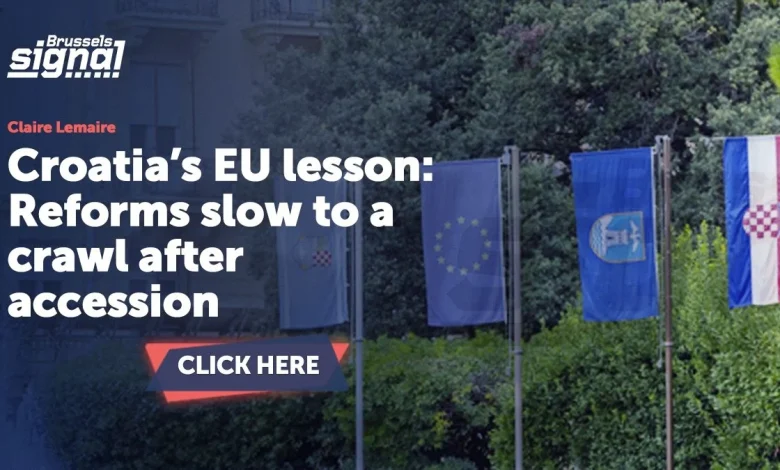Croatia’s EU lesson: Reforms slow to a crawl after accession

What happened after Croatia finally joined the European Union shows how fast countries are left on their own once the European spotlight fades, according to a Croatian civil society advocate.
For Smart Croatia, an association for civil society development, the decade-long journey to EU membership in July 2013 resulted in a rare moment when the country moved forward fast.
Civil society expanded, institutions improved and political leaders suddenly had to meet clear standards. But once the EU said, “You’re in,” that pressure — the force Igor Bok from Smart Croatia calls “the big driver” — disappeared “almost instantly”.
In simple terms, the reforms that happened because Europe was watching slowed down the moment it stopped watching.
Speaking to the European Policy Centre (EPC) in Brussels yesterday, Bok said: “We had our golden age for civil society and democratisation during accession,
“After accession, the EU steps back, and then you’re left with your own governments and your own problems.”
Croatia’s applied to join the EU in 2003, opened negotiations in 2005 and wrapped up the final institutional steps in 2011.
The decisive moment came in January 2012, when Croatians voted in a national referendum — 66 per cent supported joining. On 1 July 2013, Croatia officially became the EU’s 28th member.
But what followed illustrates why many Croatians now feel stuck, according to Smart Croatia.
An Ipsos 2025 survey shows the country among the most dissatisfied in Europe.
Only 18 per cent of people say they are satisfied with how democracy works — one of the lowest levels in the study.
Some 73 per cent fear democracy will deteriorate in the next five years. While countries in northern Europe worry most about “fake news”, Croatians point overwhelmingly to corruption: 80 per cent see it as the biggest danger to their democracy.
A 2025 rule‑of‑law report by the Konrad‑Adenauer foundation reads that “public trust in Croatia’s justice system remains weak, despite oversight bodies being in place”.
While some reforms are recognised — for instance, judges’ and prosecutors’ pay was raised in early 2025 — the courts system is still extremely slow. Commercial cases take on average 1,147 days to resolve; civil cases, 797 days.
Corruption in the public sector remains widespread and the report warns that despite legal reforms, the deep-rooted influence of politics and economic elites continues to undermine real change, the report says.
Bok argues this is exactly what happens when the spotlight moves away; reforms lose momentum and promised strategies vanish.
Croatia has not had a national civil-society strategy “for more than 10 years”, Bok said.
New democratic tools are being tested here and there but not embedded. “We’re experimenting and piloting,” he said, “but we still don’t have a plan for how to institutionalise these democratic innovations”.
The Ipsos data shows that just 23 per cent of Croatians feel represented by their national government; 69 per cent believe the system is rigged in favour of the powerful.
Environmental governance is a clear example of how corruption weakens everything else, said Bok.
“You can have the best environmental laws in the world,” he said, “but if inspectors can be bribed and judges are corrupt, nothing will be enforced”. What should protect nature, he added, easily becomes “a tool for corruption”.
Croatia entered the euro’s so-called “waiting room” mechanism in 2020 and, on January 1 2023, adopted the euro and joined the Schengen free-travel area.





